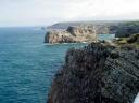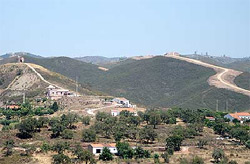|
|
|
|
Top Portugal Destinations:
Lisbon hotels Funchal hotels Lisboa hotels Albufeira hotels Porto hotels See more hotels in Portugal
World Destinations:
 Guides » Portugal » Taking a Trip to Portugal Guides » Portugal » Taking a Trip to PortugalTaking a Trip to Portugal
If you were looking for an inexpensive, interesting, and diverse European destination, then Portugal would be the idea destination! With stunning beach resorts, charming towns and cities, a magnificent landscape with numerous olive groves, wheat fields, and vineyards, and a past of seafaring adventurers, Portugal has long been a center of power and excitement. Unlike its neighbor of Spain, Portugal spent the past two decades trying to forge new ties with the rest of Europe. The people have worked hard to rebuild and restructure the economy while struggling to maintain its national culture.
Today, around 10 million people live in Portugal however, the capital city of Lisbon only has a little over 500,000 inhabitants. The history of this country dates back to the time of the Celts who had settled around 700 BC near the Iberian Peninsula. Soon, more people were drawn to this area, leading to the colonization of Greeks, Romans, Phoenicians, and Visigoths. Then by the 8th century, the Moors had also crossed over the Strait of Gibraltar, introducing the Portuguese to their culture, agricultural techniques, and architecture but they were soon met with resistance and in the 13th century, were finally ejected.  By the 15th century, the country had entered a new phase whereby Prince Henry the Navigator had pushed for the expansion of overseas exploration. This led to mariners heading out to find new routes for trade, which actually helped to create a massive empire that would one day extend all the way to Brazil, Africa, India, and the Far East. During this time, Portugal saw tremendous wealth and power but toward the end of the 16th century when Felipe II from Spain claimed the throne, things began to change. Even though the Spain only ruled the country for a short time, the decline of the empire continued. By the 15th century, the country had entered a new phase whereby Prince Henry the Navigator had pushed for the expansion of overseas exploration. This led to mariners heading out to find new routes for trade, which actually helped to create a massive empire that would one day extend all the way to Brazil, Africa, India, and the Far East. During this time, Portugal saw tremendous wealth and power but toward the end of the 16th century when Felipe II from Spain claimed the throne, things began to change. Even though the Spain only ruled the country for a short time, the decline of the empire continued.
Then at the end of the 18th century, Napoleon Bonaparte sent his men into Portugal to invade but they were met by Anglo-Portuguese alliance. The following century, Portugalís economy was faltering at the same time republicanism was established. With such incredible turmoil in the nation, the monarchy was abolished in 1910, leading to the democratic republic being founded. Around 1926, dictatorship under Antonio de Oliveira Salazar occurred but suffering from serious brain trauma from a fall, his reign ended. Since then, there were anachronistic attempts, the Revolution of the Carnations, difficult political changes, and a suffering economy. However, today, with new leadership and a country with heart to survive and thrive, Portugal is doing well. While there are several types of music heard throughout Portugal, the best known is called Fado, melancholic type music that is believed to have originated during the 16th century. However, in most of the rural towns, you will see and hear the traditional folk dancing. The Portuguese are also known for a unique type of decorative tile called Azulejos. This particular technique for creating and designing tile was learned from the Moors, which continues to be a stunning craft. When dining in Portugal, you will quickly discover that you can get a great meal at a very, affordable price. Most of the time, you will be served massive portions of foods such as Sardinhas Assadas, which is charcoal grilled sardines, Pasteis de Bacalhau or cod fishcakes, or perhaps Caldo Verde, cabbage and potato soup. Other favorites include Linguado Grelhado, grilled sole fish and Bife de Atum or tuna steak. Typically, the people of Portugal will drink an excellent port or wine with each meal. Located just to the west of Spain, Portugal is bordered by the Atlantic Ocean to the south. Then if you head to the southwest and west, you will find Madeira and Azores, respectively. With incredibly rich landscape to the north, farmers often grow foods such as potatoes, rye, and corn but then to the south, you find the area not nearly as populated. When visiting Portugal, keep in mind that the months of April to October are warm and in fact, if you head toward the south during the summer, you will probably experience hot temperatures. For the winter months, the north region of Portugal receives a lot of rain and it can be quite cold. If you want to experience one of the finest European countries, then you should definitely take a trip to Portugal. You will always find celebrations and festivals to include Carnaval, one of the countryís biggest events where there is plenty of partying, painted faces, parades, dancing, music, and more. Finally, the month of June features Festa de Sao Joao, which is a massive celebration in the streets with fine food and fun. Last Updated: 10/19/2006 3:14:00 PM Mode articles for Portugal In Faro, Portugal, children and adults alike can spend time visiting the Algarve Live Science Centre. Open every day excluding Monday, the cost to enter is inexpensive while inside,
In Faro, Portugal, children and adults alike can spend time visiting the Algarve Live Science Centre. Open every day excluding Monday, the cost to enter is inexpensive while inside,... continue >>  Cape St. Vincent, also called Cabo Sao Vicente is located in the southwest corner of Europe. There, you will discover towering cliffs that look out over the Atlantic Ocean. The fascinating thing about Cape St.
Cape St. Vincent, also called Cabo Sao Vicente is located in the southwest corner of Europe. There, you will discover towering cliffs that look out over the Atlantic Ocean. The fascinating thing about Cape St.... continue >>  Silves, Portugal is an old, walled city that sits among the largest orange growing area in Portugal. This town boasts a Gothic style cathedral, castle, and a beautiful environment that is rich with its Arab past. Every
Silves, Portugal is an old, walled city that sits among the largest orange growing area in Portugal. This town boasts a Gothic style cathedral, castle, and a beautiful environment that is rich with its Arab past. Every ... continue >> |
|
| | |
|
©2025 HotelsRu.com About us Privacy Site map Taking a Trip to Portugal |
|
 Look for deals on hotels?
Look for deals on hotels?